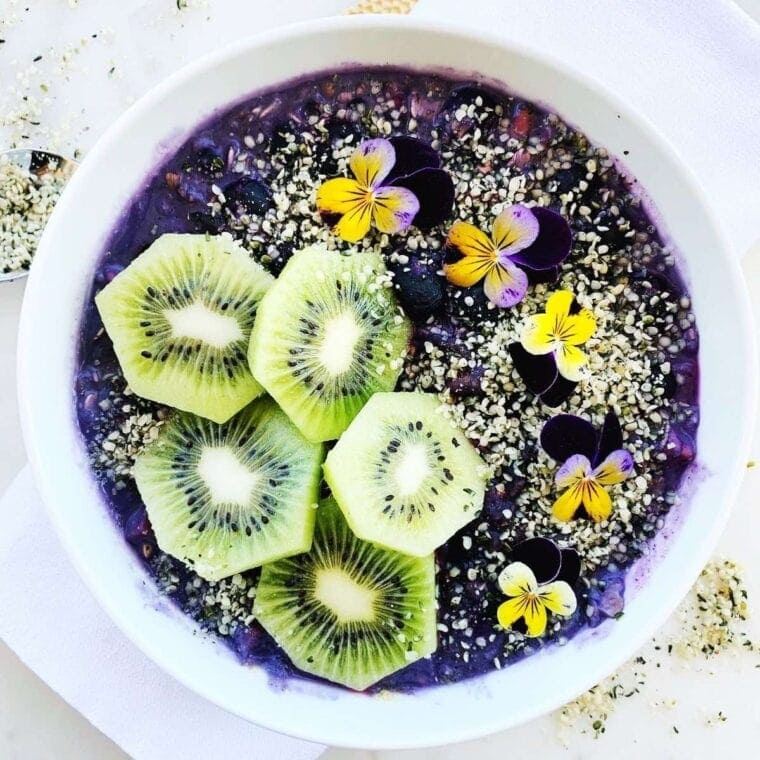Leaky Gut Diet Plan: What to Avoid and 7 Day Meal Plan
Does diet help heal leaky gut? Learn what foods to eat (and not eat) on a leaky gut diet plan for autoimmune disease, digestive symptoms, and overall health. Get a free 1-week Leaky Gut Diet Plan too!
Note: Please do not use the information in this post to diagnose or treat any disease. Please consult your physician or qualified healthcare provider before undertaking therapeutic diets.

Table of contents
- What is a leaky gut?
- Leaky Gut Symptoms
- What causes a leaky gut?
- Leaky Gut Diet Plan: What to eat
- Leaky Gut Diet Plan: What foods should you avoid if you have a leaky gut?
- Do probiotics & other supplements help heal leaky gut?
- What else can you do to heal a leaky gut?
- Summary + Putting It Into Practice
- Looking for more digestive health resources? Check out these posts!
Until recently, the established medical community hadn’t recognized leaky gut syndrome as a medical condition. Still, growing research suggests that leaky gut, aka increased intestinal permeability, may be associated with gut troubles and autoimmune disorders (i.e., Hashimoto’s, lupus, rheumatoid arthritis, Sjogren’s) and other health conditions. (1, 2, 3)
What exactly is a “leaky gut?” Do you have it? How does it happen? Is there a specific leaky gut diet plan?
Bad news, good news
Let’s cut to the chase. While there’s no definitive leaky gut diet plan, a gut-friendly anti-inflammatory diet can’t hurt. And it may help. I’ll return to this in a minute, but first, let’s define leaky gut, list the symptoms, and discuss potential causes.
What is a leaky gut?
Millions of cells line your digestive tract in a single layer. This layer, if spread out flat, covers 400m2 of surface area! These intestinal cells help the body absorb what we need from foods and drinks while keeping the bad stuff out. Your gut lining acts as a gatekeeper, allowing essential nutrients and avoiding harmful substances.
This ability to selectively absorb some things while keeping others out is only possible when our gut cells work correctly and are tightly joined together. The bonds that keep the cells of your gut lining tightly together are called “tight junctions.”
A leaky gut happens when the tight junctions aren’t so tight anymore. Intestinal inflammation irritates and weakens the gut lining, allowing tiny holes to appear in the intestinal wall.
These perforations allow things that generally would stay out of the bloodstream to get into the bloodstream, including undigested food particles, waste products, and harmful bacteria.
When these substances enter the bloodstream, your immune system is put on high alert, similar to how it reacts to a cold or a flu virus. This immune reaction is normal and helps keep you healthy, but long-term hypervigilance leads to inflammation.
Leaky Gut Symptoms
The symptoms of leaky gut are similar to those of other digestive health conditions like inflammatory bowel disease, irritable bowel syndrome (IBS), and celiac disease. Symptoms can include diarrhea, constipation, cramps, bloating, food sensitivities, or nutrient deficiencies.
Symptoms can appear anywhere when these food particles, toxins, and bacteria get absorbed into the bloodstream. For example, studies show that a leaky gut may feel like fatigue, headaches, confusion, difficulty concentrating, brain fog, joint pain, or skin problems (e.g., acne, rashes, eczema).
Links with leaky gut and other health issues include diabetes, polycystic ovarian syndrome, liver disease, chronic fatigue syndrome, and autoimmune diseases such as lupus and multiple sclerosis. There may even be links to anxiety and depression.
Many of these gut and non-gut symptoms and conditions are linked to chronic inflammation, but more research is needed to understand how they are connected.
Diagnosing a leaky gut is challenging, even if you have some of these symptoms. While some biomarker tests are available to clinicians, there isn’t a reliable diagnostic test yet. So, it’s difficult to say whether your symptoms are from a leaky gut or whether a leaky gut is a symptom of another issue.
Leaky Gut Symptoms Recap: Gut issues (diarrhea, constipation, abdominal cramping, bloating). Also, extraintestinal symptoms include fatigue, headaches, confusion, difficulty concentrating, brain fog, joint pain, and skin problems (acne, rashes, eczema).
What causes a leaky gut?

It’s not 100 percent clear what causes those bonds to loosen, resulting in tiny perforations in the gut barrier. We’re just starting to understand how the gut barrier functions. Much ongoing research is on the protein zonulin, as higher zonulin levels are linked with gluten and bacteria overgrowth. (4, 5)
Part of a leaky gut may be due to the genes you inherit from your parents. It can also be from medications like NSAIDs (i.e., Ibuprofen), strenuous endurance exercise, or gut infections. (6) Eating a diet low in gut-friendly fiber (most adults should aim for 25-30+ g of fiber per day) is also linked to increased intestinal permeability. (7, 8)
It can also be from consuming too much added sugar, saturated fat, and alcohol. (9) A leaky gut may also result from stress or an imbalance in the diversity and numbers of your friendly gut microbes.
Also, as we age, cells can get damaged more easily and heal slower, including the cells that line your gut, leaving you more susceptible to a loosened gut barrier. (10)
Leaky Gut Diet Plan: What to eat

Fortunately, you can eat many delicious foods on a leaky gut diet plan. Specifically, focus on eating an anti-inflammatory, polyphenol-rich whole foods diet, like the Mediterranean diet. And enjoy more foods rich in gut-friendly probiotics, prebiotics, and fiber. These include:
- Vegetables: (e.g., artichokes, asparagus, beets, broccoli, Brussel’s sprouts, cauliflower, leafy greens, mushrooms, onion, sweet potato, squash)
- Fruit (e.g., apples, blackberries, blueberries, purple and red grapes, kiwi, oranges, pears, raspberries, strawberries, passion fruit, papaya)
- Fatty fish (e.g., anchovies, mackerel, rainbow trout, salmon, sardines, tuna)
- Probiotic-rich dairy products (e.g., yogurt or kefir)
- Fermented foods (e.g., kimchi, miso, sauerkraut, and tempeh)
- Nuts and seeds (e.g., almonds, cashews, chia seeds, flaxseeds, hempseeds, pecans, pistachio nuts, sunflower seeds, walnuts)
- Beans and legumes (e.g., chickpeas, black beans, edamame, lentils, other beans)
- Whole grains, gluten-free grains if necessary (e.g., buckwheat, fonio, oats, quinoa, brown or purple rice, sorghum, teff)
- Healthy fats (e.g., extra virgin olive oil, avocado oil, expeller pressed high-oleic safflower oil)
- Optional Protein (e.g., skinless turkey and chicken, eggs, grass-fed beef)
- Miscellaneous (e.g., capers, coffee, unsweetened cocoa, herbs, spices, tea)
Pro Tip: If you’re going to increase your fiber intake proactively, do it over several days or weeks because sudden increases in fiber can cause gas, bloating, and other gut discomforts. If you have IBS, talk to your doctor or me to see if certain fibers worsen your condition and which are recommended.
Leaky Gut Diet Plan: What foods should you avoid if you have a leaky gut?
One way to approach a suspected leaky gut is to address inflammation and eat a more gut-friendly diet. Foods to avoid or minimize on a leaky gut diet plan include:
- Alcohol
- Highly processed food
- Certain food additives
- Artificial sweeteners
- Saturated fats and vegetable oils high in omega-6 fatty acids
- Foods high in added sugar.
Avoiding foods you’re allergic to or sensitive to is also a good idea. For example, suppose you have been diagnosed with celiac disease. In that case, you want to avoid gluten, as exposing your gut to it can cause a significant inflammatory response.
In addition, as mentioned earlier, gluten increases zonulin levels, increasing gut permeability in people with celiac disease. While human studies are limited, at least one study found patients with gluten sensitivity also experienced increased intestinal permeability. (11) So, discussing a gluten-free diet trial with your physician or dietitian may be worth discussing, but only after you’ve ruled out celiac disease.
Do probiotics & other supplements help heal leaky gut?
While this article focuses on what foods to eat (or not) for a leaky gut diet, clinicians may also suggest leaky gut supplements to help heal your intestinal lining and increase good bacteria for healthy gut flora.
These supplements may include glutamine, zinc, saccharomyces boulardi (a non-pathogenic yeast), probiotics, fiber supplements, and digestive enzymes.
In particular, glutamine is one of the most studied compounds for reducing intestinal permeability. One study on IBS-D patients showed a lessening of intestinal hyperpermeability, reduced IBS-SS (Irritable Bowel Syndrome Severity Scoring System) scores, and a reduction in diarrhea in patients receiving glutamine compared to controls. (12)
While there are few direct studies on probiotics and leaky gut, certain strains of probiotics, including Bifidobacterium lactis BB-12, Lactobacillus plantarum, Lactobacillus rhamnosus GG, and others, may support intestinal barrier function. If you are considering taking a probiotic supplement or other supplements to help support a leaky gut, work with your dietitian or physician to help you choose the appropriate ones.
Fiber supplements such as psyllium husk powder and partially hydrolyzed guar gum may also be beneficial. These fiber supplements act as prebiotics, serve as food for good gut bacteria, and produce helpful short-chain fatty acids.
(Learn more about the potential benefits of glutamine, probiotics, and additional supplements in the leaky gut: Eating to Heal a Leaky Gut at Today’s Dietitian.)
What else can you do to heal a leaky gut?

In addition to following a leaky gut diet, lifestyle changes may help, too. This includes:
- Regular exercise. Taking even a 15- or 20-minute walk after eating helps digestion.
- Self-care & sleep. Hobbies, stress management, getting 7-8 hours of quality sleep, and other things that make you happy are crucial for daily self-care. (Read more: 31 Days of Self-Care Tips to Soothe Your Mind, Body, & Soul and The Ultimate Guide to Natural Sleep Tips for Better Health.)
- Don’t smoke. And, as mentioned in the dietary section, avoid or minimize alcohol use.
- Manage your meds. If you require ongoing meds for pain management, like NSAIDs, talk to your doctor about alternatives that don’t lead to increased intestinal permeability.
- Consider food journaling to see if your lifestyle and dietary changes improve your symptoms.
Sample 1-Week Leaky Gut Diet Plan
Enjoy this 1-week leaky gut diet plan. It’s based on an anti-inflammatory eating plan and is also gluten-free. For recipes with an *, make enough to have leftovers for lunch the next day.

MONDAY
- Breakfast: Blueberry Smoothie Bowl (photo above)
- Lunch: Easy Lentil Salad
- Dinner: Healthy Pasta w/ Crispy Rosemary Chickpeas*
TUESDAY
- Breakfast: Paleo Pumpkin Muffins*, Greek Yogurt, Orange Wedges
- Lunch: Healthy Pasta w/ Crispy Rosemary Chickpeas (leftovers)
- Dinner: Miso Maple Broiled Salmon*
WEDNESDAY
- Breakfast: Chai Spiced Muesli*, Banana, Glass of Kefir
- Lunch: Miso Maple Broiled Salmon Nicoise Salad (leftovers)
- Dinner: Easy Vegan Tortilla Soup*, Apple Slices w/ Cinnamon
THURSDAY
- Breakfast: Greek Yogurt Parfait, Banans Foster Style
- Lunch: Vegan Tortilla Soup (leftovers), Side Salad w/ Avocado
- Dinner: The Yummiest Vegetarian Stuffed Squash*
FRIDAY
- Breakfast: Easy Smoked Salmon Sandwich w/ Avocado & Greens
- Lunch: Vegetarian Stuffed Squash (leftovers)
- Dinner: Rainbow Rotisserie Chicken Salad*
SATURDAY
- Breakfast: Chia Oatmeal Pumpkin Power Bowl
- Lunch: Rotisserie Chicken Salad (leftovers), Gluten Free Crackers
- Dinner: Easy Shakshuka Recipe*
SUNDAY
- Breakfast: Vegan Oatmeal Pancakes (fun treat!), Raspberries
- Lunch: Easy Shakshuka Recipe (leftovers)
- Dinner: Smoky & Sweet Turkey Chili, Apple Slices w/ Cinnamon
BONUS! Choose one of these healthy treats to make and enjoy each day!
Summary + Putting It Into Practice
No. 1 | A leaky gut is associated with intestinal and extraintestinal symptoms. It’s an inflammatory condition linked to metabolic disorders, autoimmune diseases, and even mental health. Unfortunately, there is no good diagnostic test to know whether you have it. And remember, this is still a relatively new area of research, so stay tuned for more information & analysis.
No. 2 | In the meantime, While there’s no standard leaky gut meal plan, a few simple shifts toward an anti-inflammatory, high-fiber, probiotic-rich, gut-friendly diet may help heal your gut. You may also want to try a gluten-free diet with approval from your physician or dietitian AFTER testing for celiac disease.
No. 3 | Remember that regular exercise, stress management, and quality sleep are great lifestyle strategies for your gut and the rest of your body.
No. 4 | Also, try cutting down on alcohol, processed foods, and any that you may be allergic to or sensitive to. Replace these foods and drinks with a nutrient-dense anti-inflammatory meal plan.
Adding a wide variety of plant-based foods to your diet is one of the best ways to boost microbiome diversity and may help address a leaky gut. Join my 30-40+ Plants per Week Challenge and get all the tips, tools, and DELICIOUS recipes you need to add more plant-based foods to your diet!
Looking for more digestive health resources? Check out these posts!
Did you enjoy this post?
Please leave your comments or questions and share this post with your friends and family. I truly appreciate your support!












